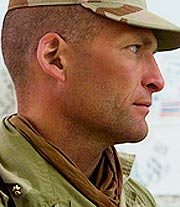
American soldiers face the prospect of serious injury and death with unflinching courage. Their existence within a nation dominated by a self centered “me culture” is yet another paradox which can be found “only in America.”
When Todd Beamer boarded Flight 93 on September 11, he never dreamed that terrorists intended to fly that very plane into the Capitol or the White House. Such an act would have been an even greater psychological blow to an already devastated nation. He could have sat quietly in his seat and done nothing, but instead courageously chose to lead fellow passengers against hardened terrorists with the words, “lets roll.” His actions have earned him the title of hero and are considered by some to be the first strike against terrorism.
Heroes seem to be a rare commodity in what could be called the “me culture” of modern day America. Everything seems to be centered on self. Issues like homosexual marriage, abortion and stem cell research are debated on the basis of individual rights and the idea of a higher law or the common good are cast aside.
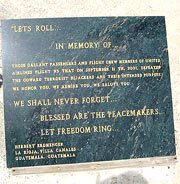
Yet from the day Todd Beamer fought the terrorists aboard flight 93 until now, American soldiers have continued to roll. They risk their lives fighting for a higher cause, alongside others who are concerned solely about themselves. The existence of such heroes in the midst of the modern day “me culture” is yet another paradox which can be found Only in America.
Such a thesis would appear questionable since we hardly ever hear about such men. Pat Tillman, the former professional football player for the Arizona Cardinals, changed all that. Neither the glow of stardom nor the comforts of a million-dollar bank account were obstacles in his quest to serve a higher ideal. His death in Afghanistan in April of 2004 captured the imagination of a nation and the enthusiasm for such a man continues, even with the emphasis that his death was the result of friendly fire.
The reason for this is simple, heroism is contagious. Regardless of where and when it takes place, those who witness it are mesmerized. Those who hear about it are compelled to follow. No one forgets. The heroic early Christians, killed by the Romans, were ignorant of this fact and did not realize the blood they shed was the seed of new faith. Likewise the heroism of our American soldiers should inspire the nation which produced such brave men.
Learn All About the Prophecies of Our Lady of Good Success About Our Times
Equally important is the fact that heroism is timeless. When a person does something truly heroic he becomes mythical or larger than life. Once a person earns such a status it remains forever as a testimony to that individual’s accomplishment. To forget MacArthur’s promise to the Filipino people “I shall return” therefore is as hard as overlooking Churchill’s capacity of rallying a nation with the counsel to “never give up.” Such men looked towards a higher ideal, faced the odds and will forever be remembered for doing so.
Catching Bullets Rather Than Footballs
This was the very reason that Jeremy Staat, a former defensive lineman of the Pittsburgh Steelers, decided to join the military. He was a personal friend of Pat Tillman at Arizona State University and like the rest of the nation he grieved his death. His mother, Janet Staat, of Bakersfield California, was not surprised by her son’s decision.
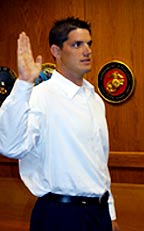
“At first it takes your breath away,” she said. “I watched him make a decision to go from being an elite [in the NFL] to possibly not having a blanket to sleep with.”
He had everything money could buy” she continued, “but was not happy.” He played a sport he loved and was paid dearly to do so, yet like Tillman, he yearned for more.
With his graduation from the Marine Corp in March satellite trucks from major news networks descended upon the Staat home. They all wanted an interview with the man whose life was a carbon copy of Pat Tillman. “It didn’t seem right that we pay entertainers millions to catch a football,” the fresh new Marine was quoted as saying, “when we pay our Marines pennies to catch a bullet.”
Duty, Honor, Country
The desire to serve a higher cause is by no means a monopoly enjoyed by football players. Months after Tillman’s death, Patrick Daley of Chicago chose the same path. The son of Mayor Richard Daley had spent a year at West Point as an impressionable 18 year-old before finishing college at the University of Illinois. He later earned a masters degree in business from the University of Chicago and could easily expect the lucrative career that his education and family name would bring.
In November of 2004, he surprised those who knew him with the decision to enlist in the Army and later reported to the airborne infantry. Although he spent only a year at West Point he always remembered their uplifting motto “Duty, Honor and Country.” He admitted that back then he was too young to really understand what it meant. Now he knows and at the time of his enlistment faced the prospect of a trip to Iraq with an almost childlike candor. “Think of it” he said, “It’s amazing. I get to serve my country.”
It could be argued that the examples given represent naïve individuals ignorant of what is involved in the service of one’s country. The idea of sacrifice and personal risk would appear a romantic dream of young men who are unaware of the reality of armed conflict.
“I Was Just Doing My Job”
No one would know of such a reality better than Capt. Brian Chontosh of Rochester, N. York. In March of 2003, he found himself in a life threatening situation when the platoon he was leading came under attack from a “coordinated ambush of mortars, rocket propelled grenades and automatic weapons fire.”
Caught in a kill zone, with tanks blocking the road ahead, he did the unthinkable and ordered his driver to advance directly towards a .50 caliber machine gun. He then exited his vehicle and began to clear the trench with his rifle and pistol. Running out of ammunition, he grabbed discarded weapons from stunned Iraqis and continued his virtual one-man-assault. Spotting an abandoned enemy RPG launcher close by, he used it to inflict yet more damage. When the sand settled, he had cleared 200 yards of trench and killed 20 enemy soldiers in the process.
After receiving the Navy Cross –the second highest military honor—he downplayed his exploits; “I was just doing my job.” Although he came away virtually unscathed that day, others are not so fortunate.
“300 Holes In His Body, Courage In His Heart”
In July 2004, a Humvee in Sgt. Paul Brondhaver’s convoy broke down in a city north of Baghdad. He ordered a box formation around the vehicle while mechanics went to work. Moments later a rocket propelled grenade struck nearby sending him 12 feet in the air and killing his friend Pfc. Samuel Bowen who was standing next to him.
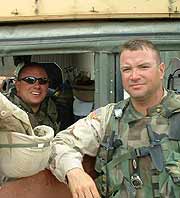
What happened next defies belief. Although suffering over 300 wounds, inflicted by hot pieces of shrapnel, he refused help and ordered medics to look after those more “seriously wounded.” Weakened by the loss of blood yet full of determination, he crawled to a nearby Humvee where he radioed for a helicopter to evacuate the wounded and dead. Leaning out the window he then fired upon enemy soldiers and ordered a machine gunner to lay down more suppressive fire.
Sgt. Brondhaver survived that harrowing day yet admitted “My heart is still there with my men. I need to get back to Iraq” he said, “and finish what I started.”
“Wounded Warriors”
Lt. Col. Tim Maxwell, a 20-year veteran in the Marine Corps also knows what war is like. While stationed in central Iraq in October 2004, he laid down for what he hoped would be a ten minute nap. His brief respite from battle was rudely interrupted when a mortar round exploded nearby and knocked him unconscious. He would later wake up in Bethesda Naval Hospital with tunnel vision, broken bones and severe brain damage. As an officer who for years had led men in battle with a compass, he would now have to re-learn what one is.
Learning to read again with children’s books was difficult but thanks to military discipline and the help of a speech pathologist he improved rapidly. The effort however was so grueling that he ended some sessions drenched in perspiration.
One of his biggest struggles was overcoming depression caused not from the rigors of war but the separation from fellow heroes still fighting in Iraq. Like Sgt. Brondhaver, he would like to return but his injuries will not allow it. He now devotes his time to helping fellow Marines through a pilot program called “Wounded Warriors.”
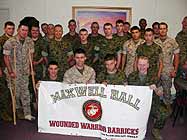
The most notable recipient of Col. Maxwell’s kindness is Sgt. James Sturla, a 26 year old tank commander, who was “de-gloved” during an attack in western Iraq. Although he had the skin and muscle ripped right off his hand he is now preparing for redeployment. Col. Maxwell’s wounded warriors are not the only injured soldiers wishing to return to combat.
David Rozelle of Fort Carson, Colorado lost his right leg in June 2003 when the Humvee he was riding in detonated an anti tank mine. Rehabilitation was difficult but with the help of a prosthetic he was soon running a ten minute mile on a treadmill. In November of 2004 he completed the 26 mile New York City Marathon and is now back in Iraq. He recounts his moving story in his memoirs, Back in Action: An American Soldier’s Story of Courage, Faith, and Fortitude.
Re-enlistments Are Up
It has been five years since Todd Beamer’s “lets roll.” What began with flag waving and yellow ribbons however, some have reduced to body bag counts and prison abuse scandals.
In the midst of negative news however there is one striking piece of information which goes unreported. In the last six months, the Army has recorded a 15% increase in re-enlistments; an upward trend which began in 2001. More significant still is the fact that 69% of those killed in Iraq come from this branch of the Armed Forces.
Why do so many soldiers reenlist? It is because heroism is truly timeless, contagious and another Only in America paradox.

